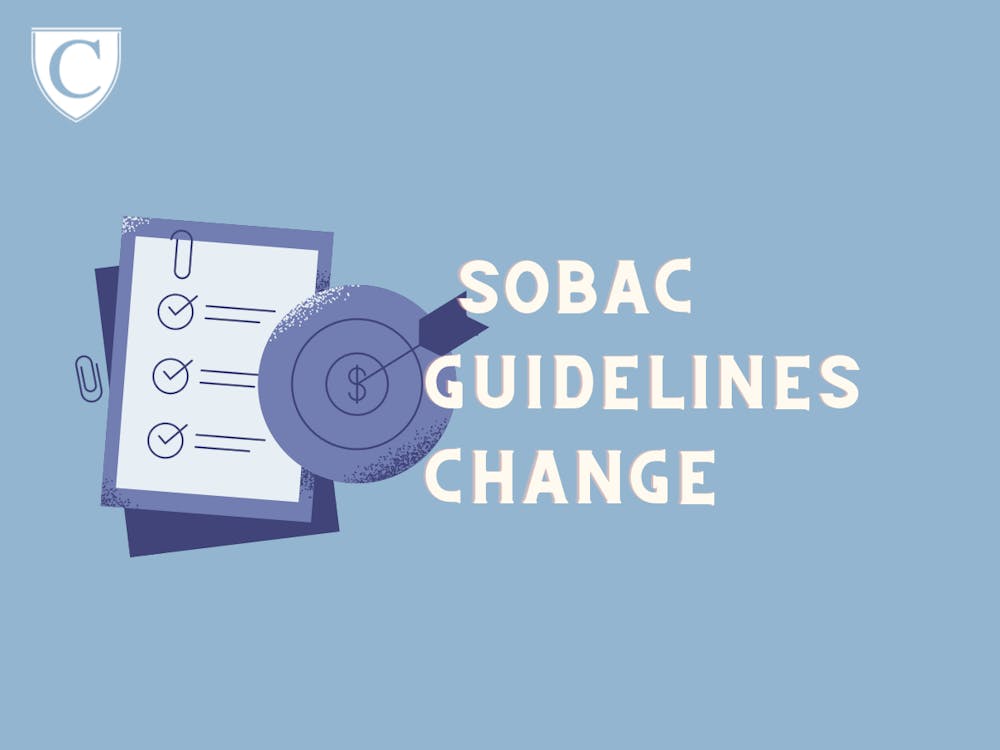Editor's note: The Collegian is affected by the changes to the SOBAC guidelines.
University of Richmond student governments changed the funding procedure for registered student organizations Jan. 18 by passing an updated plan from the Student Organization Budget and Appropriations Committee.
The updates limited the sources of funding selective student organizations can receive, provided more avenues for event funding and set a maximum allocation for travel expenses.
“The goal of changing these guidelines was to simplify the process, because it is a confusing funding process, and to make the funding more accessible and equitable across the board,” Vittoria Tripp, associate director for student engagement, said.
The Richmond College Student Government Association and Westhampton College Government Association passed the guidelines on Jan. 18, and the SOBAC committee notified affected student organizations by email on Jan. 27.
The changes were made to improve student life, and the decision was initiated by the financial affairs committees, UR senior Penny Hu, president of WCGA, wrote to The Collegian in an email.
The decision passed by a wide margin in the Senates, RCSGA Vice President of Finance and UR junior Brady Lang said.
The new guidelines drew criticism from members of selective student organizations like a capella groups, academic fraternities, media organizations and other arts groups, who will no longer be able to apply for annual funding.
The guidelines do not allow club sports teams, religious/spiritual groups, Greek organizations, honor societies or any selective organizations to apply for annual funding. The only funding selective organizations can apply for is contingency funding on a rolling basis, for program and event expenses only, according to the guidelines.
The SOBAC committee believes selective organizations should be eligible for funding only for programs and events that are open to campus. The annual process money is reserved for the open membership organizations that are going to impact the largest number of students, Tripp said.
Open membership organizations can apply for annual or contingency funding for operating costs, durable goods, promotional items, publications, event expenses and travel, according to the guidelines.
The idea to make changes arose after student organizations brought up the lack of consistency in funding for selective groups. The committee reviewed the original guidelines for errors and simplification before making the changes, senior Joseph Coyle, president of RCSGA, said.
Enjoy what you're reading?
Signup for our newsletter
When asked about the timing of the approval process, Coyle admitted that the process was rushed to fit into the SOBAC application timeline for the semester. They wanted the new guidelines to be ready by the information sessions on Feb. 9 and 10, he said.
The group considered having a feedback period prior to the decision, but decided against it because of the timeline for the funding process, Lang said.
The senators who voted against the proposal did so mostly because they wanted to have a longer feedback period, Lang said. He understood their justification, he said, but pointed out that most organizations will still receive money for reasonable expenses.
“[Acapella organizations] were spending thousands of dollars on these [recording and mastering] fees, when for thousands [of] dollars…you could have some really great events on campus which is primarily what SOBAC is supposed to fund,” Lang said.
There is an exception in the annual funding process for selective media category organizations, which can apply for annual funding for operating expenses only, according to the guidelines.
Media category organizations provide a service to all of campus, so anything that is required for those organizations to operate, like licenses, websites and apps, the committee still wants to support, Tripp said.
“Organizations that really want to go big and request a lot of programs on campus, we really encourage them in the info sessions to do that, ask for what you want,” Tripp said. As the guidelines are new, there may also be aspects that need to be tweaked as requests come in, she said.
Applicants for contingency funding under $1,500 will no longer be required to attend a funding hearing, which is a new rule designed to make funding more accessible, Tripp said.
Along with the funding eligibility requirements, the changes also eliminated the 60/40 rule, which meant that student organizations paid 40% of their travel costs while SOBAC provided funding for 60%, Tripp said.
Removing the 60/40 rule refocused money to on-campus purposes since it is very expensive to travel, Tripp said. In place of the 60/40 rule, the new guidelines will fund a maximum of $5,000 for travel for a registered, open student organization per year.
Also, new to the guidelines, off-campus programs and events will be approved on a case-by-case basis and must be open to all students.
Hu believes the changes have better aligned the process to support and uphold the mission of improving campus life, she wrote.
“Our goal was to maximize the quality of student life on campus by being able to provide a better college experience,” Hu wrote.
“The beauty of the process is that it can always be modified,” Tripp said, “and the students have the power to do that.”
Contact writers Gareth Woo, Jenna Lapp and Kalina Kulig at collegian.stories@gmail.com.
Support independent student media
You can make a tax-deductible donation by clicking the button below, which takes you to our secure PayPal account. The page is set up to receive contributions in whatever amount you designate. We look forward to using the money we raise to further our mission of providing honest and accurate information to students, faculty, staff, alumni and others in the general public.
Donate Now



